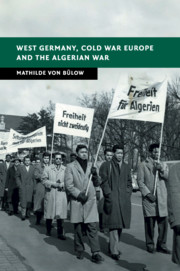Book contents
- Frontmatter
- Contents
- Acknowledgements
- List of abbreviations
- Introduction
- 1 Internationalising colonial warfare: FLN strategy and French responses
- PART I CREATING THE SANCTUARY: NOVEMBER 1954–MAY 1958
- PART II CONTESTING SANCTUARY AND SOVEREIGNTY: JUNE 1958–DECEMBER 1960
- PART III ASSERTING SOVEREIGNTY: JANUARY 1961–JULY 1962 AND BEYOND
- Conclusion
- Glossary of foreign terms
- Bibliography
- Index
Conclusion
Published online by Cambridge University Press: 05 September 2016
- Frontmatter
- Contents
- Acknowledgements
- List of abbreviations
- Introduction
- 1 Internationalising colonial warfare: FLN strategy and French responses
- PART I CREATING THE SANCTUARY: NOVEMBER 1954–MAY 1958
- PART II CONTESTING SANCTUARY AND SOVEREIGNTY: JUNE 1958–DECEMBER 1960
- PART III ASSERTING SOVEREIGNTY: JANUARY 1961–JULY 1962 AND BEYOND
- Conclusion
- Glossary of foreign terms
- Bibliography
- Index
Summary
Algeria's independence struggle is often hailed as a classic example of a counterinsurgency during which the French won every battle but lost the war. Although tactically and operationally the French military proved highly successful, the reliance on armed force could not compensate for the lack of political vision so essential to winning over the Algerian population. The sweeping political and economic reforms introduced by de Gaulle and his predecessors, while essential elements of the constructive counterinsurgency, proved too little too late to turn the war's tide in France's favour. The brutal, inhumane and undemocratic nature of the destructive counterinsurgency undermined these reforms before they could ever bear fruit. Whether the ‘militarisation’ of policing or the resort to collective punishments, mass internments and torture, the destructive tactics deployed by the French military and security services on the domestic front went against the normative values for which the Republic claimed to stand. So, too, did many of the heavy-handed measures deployed on the international front, as highlighted here by the authorities’ efforts to export methods of colonial policing to West Germany, and by their willing use of interceptions at sea, sabotage and assassinations to neutralise the FLN's West German supply networks. Ultimately, the preponderance of French military power undercut the rhetoric of inclusiveness and equality that underpinned the constructive counterinsurgency. The duality of the French war effort ensured that success in one domain cancelled out victory in the other. With opinion both at home and abroad increasingly condemning French counterinsurgency methods, the cognitive dissonance between those fighting for a French Algeria and those demanding an Algerian Algeria became unbridgeable.
Meanwhile, the tenacity and bravery of the FLN's militants in the face of the full ferocity of French repression had lent the insurgency a dynamic of its own. To Algerian diplomat Rédha Malek, the insurgency's strength lay ‘in its rootedness among the population’, though these roots were far from secure. Whether in Algeria, France, or even West Germany, they sometimes had to be reinforced by coercive means. This should not detract from the fact, observed first-hand by Pierre Bourdieu, ‘that the struggle was able to draw on strong popular sentiment for its vital strength and purpose, a sentiment inspired by an objective situation’ – the colonial situation.
- Type
- Chapter
- Information
- West Germany, Cold War Europe and the Algerian War , pp. 389 - 404Publisher: Cambridge University PressPrint publication year: 2016



